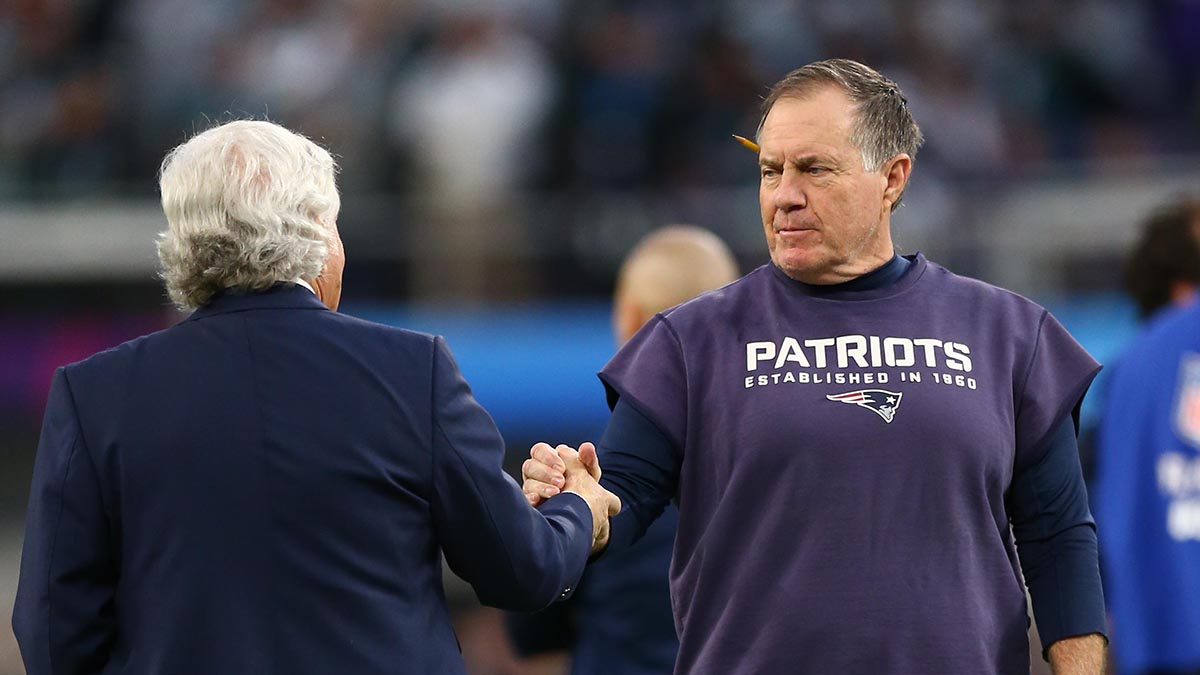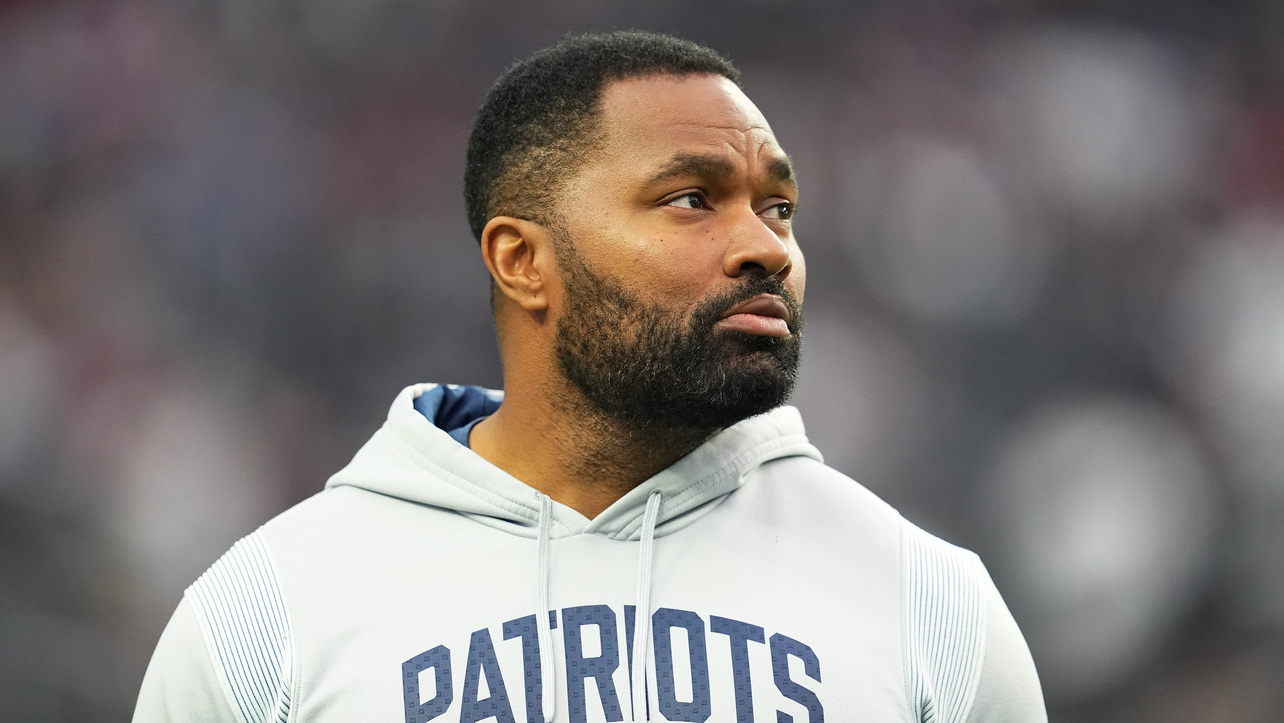At the beginning of any franchise’s Hall of Fame story, no one ever thinks of the inevitable: That one day the run of greatness will abruptly stop, and any thoughtful attempts to say goodbye to trendsetters and icons will land awkwardly.
Or clumsily.
Or sadly.
Stay in the game with the latest updates on your beloved Boston sports teams! Sign up here for our All Access Daily newsletter.
Championship daydreams tend to focus on the peaks and ignore the endings. It’s easier and more fun, in the beginning, to cast visions about the stars who will help you win a Super Bowl or two, especially if your team has never done it.
That’s where the New England Patriots were 24 years ago, when Robert Kraft first introduced Bill Belichick as head coach. On that day, January 28, 2000, there were only two coaches in NFL history – Don Shula and George Halas – with more than 300 wins. There was absolutely no evidence that Belichick would evolve into a sideline legend who would join them.
🔊 Patriots Talk: A surreal day for Patriots as Belichick era ends | Listen & Subscribe | Watch on YouTube
He was 47 and had coached the Cleveland Browns for five seasons, winning 42 percent of his games. On the day of his first Foxboro press conference, he trailed Shula by 310 wins and Halas by 287. Any ideas of chasing Shula, passing Halas, and emerging as the NFL’s greatest coach were more suited for mythology.
Really, who could coach that long?
Who could win that much?
And if any man, or god, were able to scale that sacred mountain, how would it look up there? How would watching that pursuit, week by week and year by year, change us as a football community?
MORE BELICHICK COVERAGE
The thought was unrealistic and, even in a fantasy world, unimaginable. Kind of like the reality of today: Bill Belichick, local institution, is no longer a Patriot. He has 333 wins now, nine more than Halas and 14 fewer than Shula. If he ever catches Shula, a man who once praised him and then grew to despise him, he’ll celebrate the accomplishment outside of New England.
In a press conference Thursday, Belichick announced he and the Patriots have mutually agreed to part ways, nearly a quarter century after the team owner helped form the greatest trio in pro football history.
It was Kraft, Belichick, and Tom Brady, all coming together at career pivot points. Kraft was the owner who’d clashed with his first coach, Bill Parcells, and then watched his team slide into mediocrity after Parcells left for New York. Belichick was Parcells’ gifted defensive coordinator who’d yet to prove himself as a team-builder and head coach.
Brady, despite being a starter and captain, was a University of Michigan quarterback who the school never fully understood. At times, the Wolverines’ embrace of him came off as cold and reluctant. He felt that same chill from the NFL on his draft day, 199 picks in.
Their Patriot connection became historic for all of them.
For Belichick, his six Super Bowl titles triple Shula's two and are and more than any coach in league history. He had 30 postseason wins with the Patriots, or five more playoff victories than Shula and Halas combined. No one has 10-game winning streaks in the playoffs, but Belichick’s Patriots did.
His teams appeared in so many consecutive conference title games that NBC Sports Boston once featured local eight-year-old kids who had one thing in common: In every January of their lives, their Patriots were one win away from going to the Super Bowl.
That feature concluded, by the way, with a nine-year-old boy scolding the younger children because the Patriots had spoiled them.
Correct. The same was true of the grownups.
We got used to being at the NFL’s version of the head table. There was enough to go around for everyone. Kraft watched his ownership profile rise and his franchise value soar. He welcomed celebrity moguls and musicians to his inner circle.
Belichick became the highest-paid, highest-IQ – and most literary – coach in the sport. Multiple books and documentaries were produced with Belichick as the main character. Brady established himself as a champion and MVP, one who was equally comfortable on field turf and red carpets. He married Gisele Bundchen, one of the most successful supermodels in the world.
Media members got book deals, new Patriots-themed shows, additional radio and TV appearances. Fans often got the final word, along with confetti and parades, as they punctuated their national football arguments. The region, swelled with civic pride and championship swagger, became dotted with symbols, phrases, and images that needed no explanation: cutoff gray hoodies, pictures of kicks in the snow, Lombardi Trophy license plates, We’re On To Cincinnati.
All of us got used to smart game plans, executed by situationally aware players. So it was totally on-brand when Belichick called for an intentional safety to help win a 2003 game in Denver. The next year, in Pittsburgh, it wasn’t surprising when he told linebackers Ted Johnson and Tedy Bruschi to subtly shift the nose tackle so they’d be in position to stuff a key fourth-down play in the conference championship game. Two years later, in a divisional playoff game in San Diego, Troy Brown redeemed a Brady interception. He chased the defensive back who caught it, forced him to fumble, and then recovered for the Patriots.
In Belichick parlance, that was position versatility. Brown on offense, defense, and special teams. Mike Vrabel as linebacker and red-zone tight end. Julian Edelman as wide receiver, punt returner and defensive back.
Anyone who followed the Patriots knew all the Belichick tenets by heart, and they had illustrations to support their work.
Meritocracy over status? Easy. That was choosing young Brady over veteran franchise quarterback Drew Bledsoe.
Cold business over sentimentality? That was the release of popular safety Lawyer Milloy, five days before the season started.
Do your job? That was Matt Cassel, who had attempted fewer than 40 passes in three years as Brady’s backup, stepping up and winning 11 games in 2008.
Practice how you play? Malcolm Butler, correcting a walk-through error on Friday so he could make the most famous Super Bowl interception on Sunday.
Patriots fans devoured it as part of a winning ethic. Opposing fans, players, coaches, and even owners screamed about the scandals, Spygate and Deflategate, that cost the Patriots two-first round picks.
This is when Belichick drew the wrath of Shula. In 2001, Shula raved about Belichick’s Super Bowl tactics against the heavily favored St. Louis Rams. He was still a fan in 2003, when the Patriots finished the season with 15 consecutive wins and their second Super Bowl title.
By 2007, Shula had turned. He began calling Belichick "Belicheat." Some of the anger was for Spygate. Some was for the team that came the closest to catching Shula’s 1972 undefeated Dolphins. And some was for the coaching locomotive that had unexpectedly and historically roared to life.
The almost magical 2007 season capped a seven-year stretch in which Belichick’s teams played 129 games and won 100 of them. That winning percentage, .775, shouldn’t have been sustainable. But just in case it was … Shula could hear the unusually rapid footsteps.
It wasn’t just Shula, though.
People outside of New England watched the winning Patriots, even if it was with middle fingers raised and teeth clenched. The team, and Belichick, had a reputation.
Arrogant.
Cheaters.
Insufferable know-it-alls.
And, unfortunately for opponents, consistent contenders.
Even the criticism became a rallying cry, so Patriots loyalists created and lived in a protective bubble. There, Belichick was Zeus and his approval ratings were infinite. In Bill We Trust. He had smarts and snark, like a lot of people here. He was a grump, but he was their grump.
That personality didn’t miraculously change when he stood in meetings in front of his players. He won them over more with unfiltered intellect than eloquence. His fans, his players, his bosses trusted him implicitly to figure it out. All of it. Coaching, drafting, signing, budgeting, discerning.
Everyone thought he’d always have an answer, and an elite answer at that, until he decided he wanted to stop. We didn’t predict an end like this, although we should have. The Hall of Fame is full of coaches whose legacies could have reached even further, only if…
Belichick’s hero, Paul Brown, had a chance to handpick Bill Walsh as his successor with the Bengals in the 1970s. Instead, he picked a Bill – Johnson – whom most people have never heard of. Walsh wound up in San Francisco, where his 49ers beat Brown’s Bengals in two Super Bowls.
Dan Marino, a Pittsburgh kid, wrote the Steelers and begged his hometown team to draft him in the 1980s. He could have taken over for Terry Bradshaw and revived the Steeler dynasty. But the Steelers passed and, six picks later, Shula took Marino for the Dolphins.
And although Shula got the Hall of Fame quarterback in Marino, he couldn’t manage to win a Super Bowl with him in the ‘80s and ‘90s. The problem was that the coach’s defense rarely matched the production of his offense. It’s been the opposite for his rival, Belichick, whose most glaring what if is obvious: What if he hadn’t decided to let Brady leave in 2020?
Since then, Belichick has gone retro and won 43 percent of his games, similar to how he looked when he first showed up in New England. With Brady gone, the coach’s offense rarely matched the production of his defense.
He initiated the Brady divorce and then quickly saw that he should have kept the marriage. Brady went to Tampa and won a seventh ring. Belichick stayed here and couldn’t put a ring on the fingers of Cam Newton, Mac Jones, and Bailey Zappe.
The Patriots finished 4-13 in 2023, missed the playoffs for the third time in four years, and for the first time in a generation, In Bill We Trust had vocal and local competition from Bill Must Go.
Belichick is off to a new destination, and the only thing he left unsolved in New England is the eternal football mystery. That is, what’s the best way to build a bridge from one conquered mountaintop to the next unexplored one?
Maybe it would have been seamless if he’d re-signed a 42-year-old Brady and, two years earlier, drafted Lamar Jackson to learn from him.
Did the game pass Belichick by? We’ll see. All we know now is that he didn’t leap over football mortality. He wasn’t a god after all. He was a talented team-builder with flaws and bad decision-making ruts, just like his Hall of Fame predecessors. Unlike them, he’s not stopping any time soon.
He’s 71, and he’s had more consecutive coaching years than anyone in the history of the game. He’ll do it again this season. For the first time this century, remarkably, it won’t be in Foxboro.



